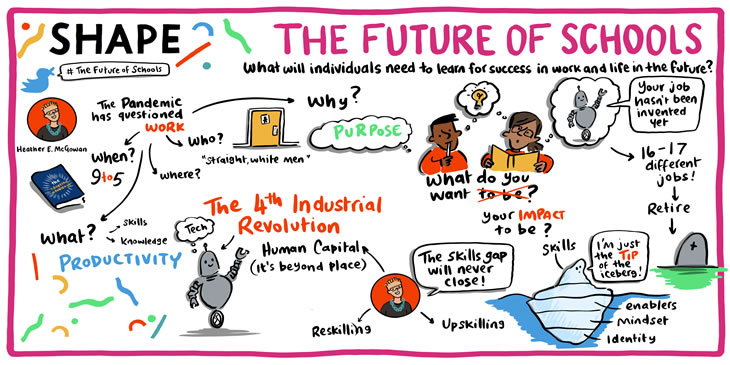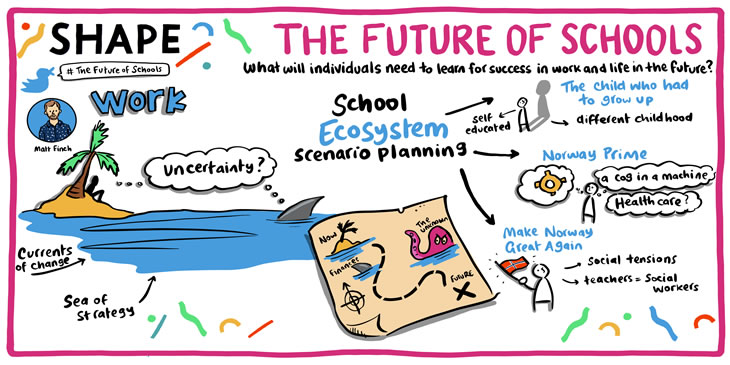On day three of SHAPE Education: The Future of Schools, our focus turned to learners and their future needs for work. This time, we spoke with Heather McGowan, Matt Finch, and Silvana Richardson to get to grips with what we need from education to prepare our learners for future challenges. Questions and discussions centred on where we work, how we work, and how this will have to change for the future as we enter the so-called fourth industrial revolution: the Digital Convergence. Read on below for some reflections on the event.
The future of work: what will work look like and why will we do it?

In the first lightening talk, Heather focused on how the world of work is in flux. She argued that current models of working are dated, and that working 8-hour days and working in silos should become a thing of the past. From Heather’s point of view, these features of work are likely to change as we are living in a time of accelerated evolution and unprecedented change. For her, the future of work will require that our learners continue to develop competence and knowledge but there will be an increased focus on their capabilities to apply that knowledge and an even greater stress on their capacity to create it. She said the future needs people who “can not only answer the question, but can formulate the question, frame the question that needs to be addressed” and with this in mind, she proposed her view on the future of work. She said that work will take place at home and in the workplace, building on lessons learned in the pandemic. The value of a diverse workforce will continue to increase, echoing the importance of equality, diversity and inclusion in education, as discussed on Day 2 of the event. For work, the focus will be on human potential, not hours of work completed and driving all of this will be individual motivation, aims for impact, and purpose. Heather’s vision of the future is an exciting one and it will mean that we, as educators, may need to rethink how we prepare our learners for the world. Watch Heather’s talk.
Predictions, assumptions, and uncertainties

In the second talk, Matt, like Mike Solly on day 2 of the event, was critical of the value and validity of predictions. Early in the talk, he made the point that a “trend is just a projection based on data and evidence from the past. No one has been to the future. No one can gather evidence from events that haven’t happened yet”. With this in mind, he stepped away from the notions of predictions and assumptions, and instead, focused on uncertainties, which can shape our vision of the future. Matt encouraged us to “imagine plausible futures that challenge [our] assumptions about what will happen next” in order to “try to get people to think bigger about the world they live in, the uncertainties that shape it, and how they might play out in the future”. For education, Matt believes that this kind of thinking can help us prepare for the unknown, anticipate challenges and issues that will need to be resolved, and force us to widen our perspectives. In Heather’s talk, she stressed the importance of framing new questions and in Matt’s talk, he demonstrated a way we can do that with critical reflection and an open mind. Watch Matt’s talk.
Discussing the future of work and education
In responding to the lightening talks, Silvana highlighted that as education evolves, she also sees the importance of “uniquely human skills” in teaching and learning, whereas teachers we will need to support the “relational, social, and dialogic aspects of education” in order to equip our learners with the social skills they need for future work. She also echoed the importance of motivation and a sense of purpose for learning and work, and calls for the future of education to foster creative and critical learners who can fulfil the needs of future work. The discussion spanned general education and English language teaching contexts, and gives a lot of food for thought. Why not watch the fireside chat? And watch out for the next blog, which is all about tools and technology shaping the future of education.
SHAPE Education is an initiative supported by Cambridge University Press & Assessment and Cambridge Judge Business School.